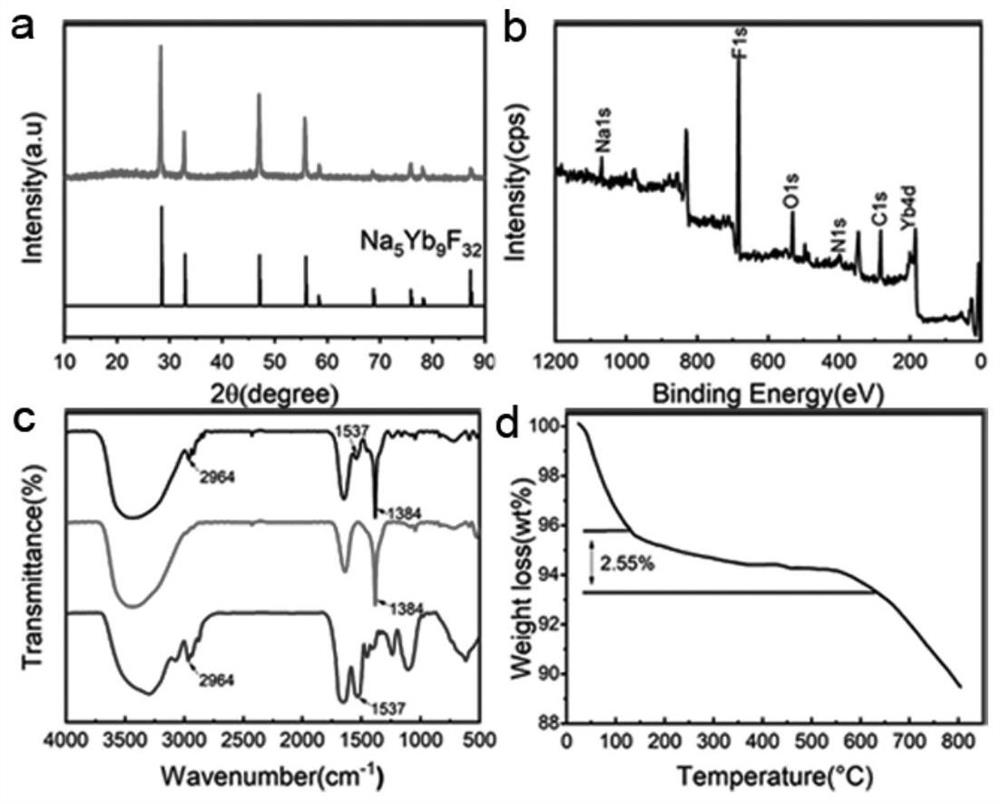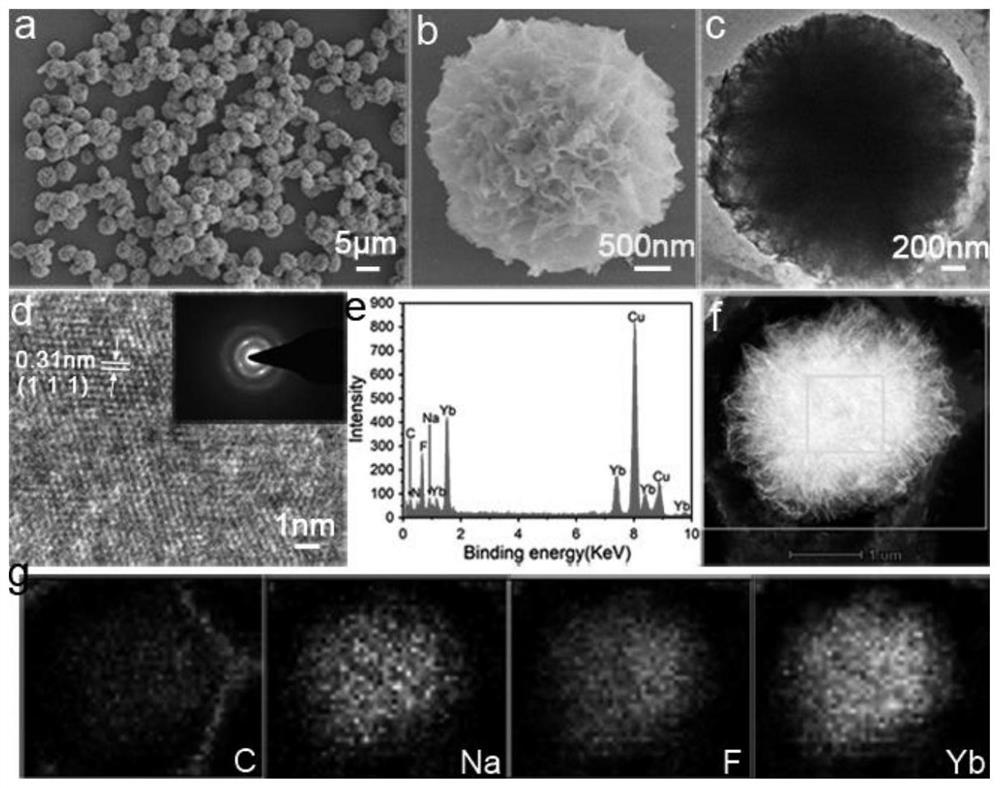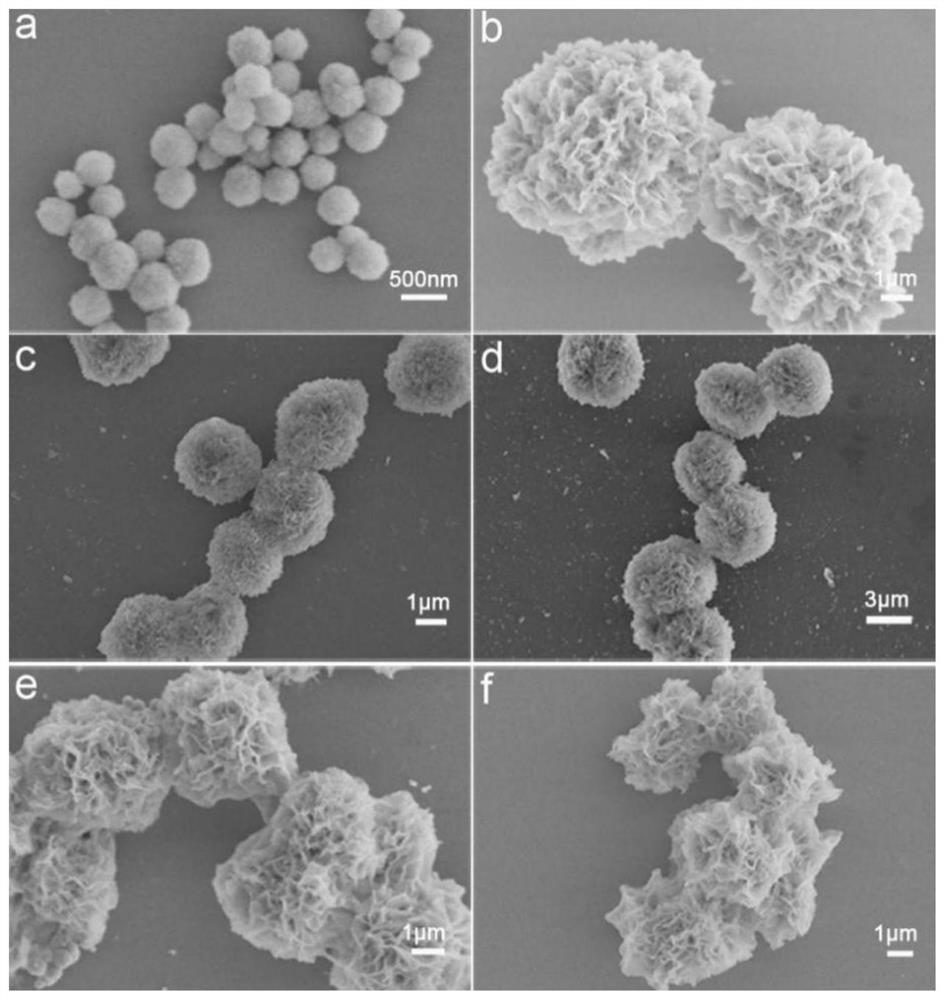A rare earth fluoride hybrid nanoflower and its preparation method
A rare earth fluoride and nanoflower technology, applied in the field of nanomaterials, can solve the problems of difficulty in controlling the morphological characteristics of nanoflowers, nanoflower structure, complex synthesis process of nanoflowers, unfavorable protein activity, etc., and achieves good immobilization effect, mild conditions, Simple preparation method
- Summary
- Abstract
- Description
- Claims
- Application Information
AI Technical Summary
Problems solved by technology
Method used
Image
Examples
Embodiment 1
[0035] Example 1 Trypsin-Na 5 Yb 9 f 32 preparation of
[0036]Add 1.0mg trypsin to 0.685mL water respectively, then add 0.1mL (0.5M) ytterbium nitrate solution, and stir for 1 hour to obtain a colorless, transparent and uniform liquid; then slowly add 0.3mL (0.5M) Sodium fluoride solution, get white floc, stir for 10min, place in 25°C incubator for 2 days, get white precipitate; centrifuge the precipitate at 10000rpm, discard the supernatant, leave the solid; use absolute ethanol Disperse the solid, purify and centrifuge three times, and dry in a constant temperature drying oven at 25°C to obtain the hybrid nanoflower trypsin-Na 5 Yb 9 f 32 .
[0037] The prepared hybrid nanoflower trypsin-Na 5 Yb 9 f 32 Perform EDX, XPS, SEM, TEM, FT-IR, TGA, electron diffraction and energy dispersive X-ray analysis.
[0038] The result is as figure 1 and figure 2 shown, where figure 1 a is an XRD pattern, in which the diffraction peaks and trypsin-Na 5 Yb 9 f 32 correspondi...
Embodiment 2
[0039] Example 2 Photoprotein-Na 5 Yb 9 f 32 :Tb 3+ preparation of
[0040] Add 1.0mg trypsin, 4.0mg lysozyme, 1.0mg recombinant collagen Ftsz, 1.0mg bromelain, 4.0mg bovine serum albumin and no protein in 0.675mL water, then add 0.1mL (0.5M) ytterbium nitrate solution, 10 μL (0.2M) terbium nitrate solution was mixed evenly, and after stirring for 1 hour, a colorless, transparent and uniform liquid was obtained; then 0.3mL (0.5M) sodium fluoride solution was slowly added dropwise to the solution to obtain a white flocculent The product was stirred for 10 minutes, and placed in a thermostat at 25°C for 2 days to obtain a white precipitate; the product was centrifuged at 10,000 rpm, the supernatant was discarded, and the solid was left; the solid was dispersed with absolute ethanol, and then purified and centrifuged for 3 times. Dry in a constant temperature drying oven at 25°C to obtain photoproteins of different protein types-Na 5 Yb 9 f 32 Hybrid nanoflowers.
[0041]...
Embodiment 3
[0043] Example 3 Trypsin-Na 5 Yb 9 f 32 :Tb 3+ activity assay
[0044] Using casein as a substrate, a casein solution (10 g / L) was prepared in 50 mM PBS buffer (pH 7.4). Trypsin-Na 5 Yb 9 f 32 :Tb 3+ Add to 1mL of 10g / L casein, incubate at 30°C for 30min, and centrifuge at 9000rpm for 5min to collect the supernatant; add trichloroacetic acid (TCA) solution (2mL, 0.4M) to the supernatant, and Let stand for 5 minutes to terminate the enzymatic reaction, and collect the supernatant by centrifugation; mix 5 mL of sodium carbonate solution (0.4 M) and 1 mL of Folin’s phenol reagent with 1 mL of the supernatant, and incubate the mixture at 40°C for 20 minutes to complete color development Reaction; the optical density at 763 nm was monitored to assess the hydrolytic properties of casein. The activity of free trypsin was assessed by the same procedure using the corresponding amount of trypsin in the hybrid nanoflowers.
[0045] Trypsin-Na under different amounts of urea or ...
PUM
 Login to View More
Login to View More Abstract
Description
Claims
Application Information
 Login to View More
Login to View More - R&D
- Intellectual Property
- Life Sciences
- Materials
- Tech Scout
- Unparalleled Data Quality
- Higher Quality Content
- 60% Fewer Hallucinations
Browse by: Latest US Patents, China's latest patents, Technical Efficacy Thesaurus, Application Domain, Technology Topic, Popular Technical Reports.
© 2025 PatSnap. All rights reserved.Legal|Privacy policy|Modern Slavery Act Transparency Statement|Sitemap|About US| Contact US: help@patsnap.com



